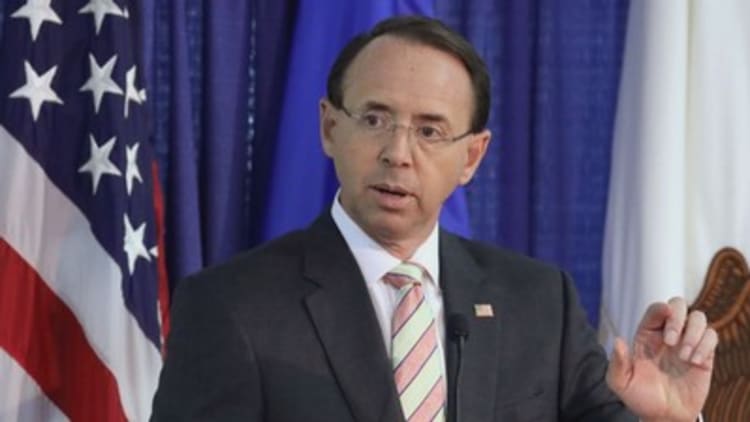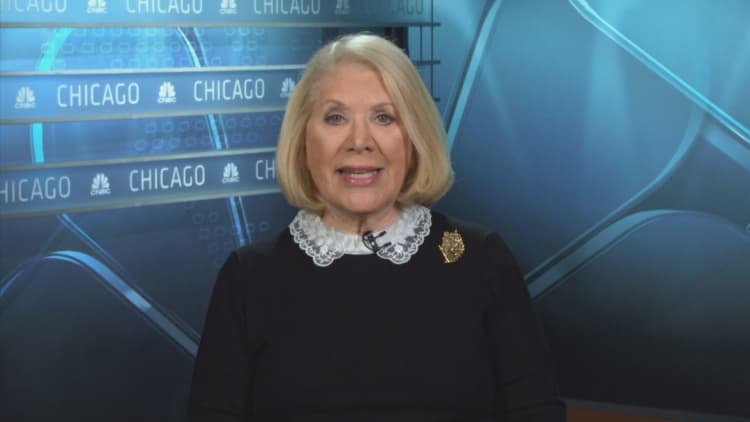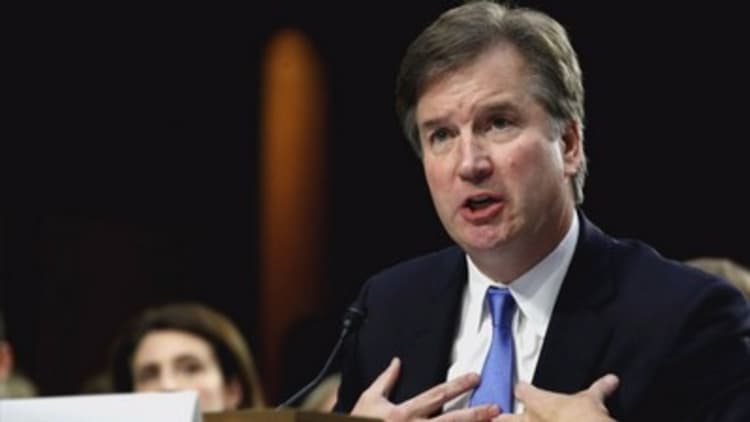All eyes are on Solicitor General Noel Francisco amid reports Monday that Deputy Attorney General Rod Rosenstein could be on the chopping block.
Rosenstein is expected to meet with President Donald Trump on Thursday to discuss his future with the Justice Department and the administration. If he's ousted or resigns, Francisco is widely expected to succeed Rosenstein as head of the Mueller probe.
In that role Francisco would have enormous control over the Russia inquiry, including determining its scope and resources.
While Rosenstein has advocated for Mueller's independence — in December, he told a House panel that "it would be very difficult to find anybody better qualified for this job" — Francisco has stayed mum, at least in public, on his views on the inquiry.

A February sighting of Francisco dining with Rosenstein and Attorney General Jeff Sessions on the same day that Trump lashed out against Sessions, calling him "disgraceful," was perceived by some as evidence that there was daylight between Francisco and the president.
Nonetheless, his expansive views on executive power worry the president's critics who fear that Francisco could limit the inquiry. They have also pointed to Francisco's former employment at Jones Day, the powerhouse law firm that has represented Trump and his allies for years, as a potential conflict of interest.
Peter Carr, a spokesperson for Mueller, declined to comment. The Department of Justice did not respond to a request for comment.
As the solicitor general, Francisco has vigorously defended Trump administration policies and successfully defended the constitutionality of a version of the president's travel ban in front of the court. A stalwart conservative, Francisco has largely kept his head down and avoided the limelight in an administration that has been riven by drama.
He's a longtime resident of the Republican legal establishment, getting his start clerking for Antonin Scalia at the Supreme Court. On Friday, he was the keynote speaker at a Washington event hosted by The Federalist Society, an influential conservative legal group.
Francisco also worked on the controversial election recount for George W. Bush, and later served in his administration for four years, first as associate counsel to the president and later in the Office of Legal Counsel as deputy assistant attorney general.

Francisco has expressed skepticism of special counsel investigations. In 2007, amid the controversy surrounding Bush's firing of a number of U.S. attorneys, Francisco was asked about the possibility of appointing a special prosecutor.
"My own personal belief," Francisco said at the time, "is that when you hand these issues off to the career prosecutors in the public integrity sections in the U.S. attorneys' offices in the Department of Justice, those attorneys are generally better able to assess whether a case should be pursued."
Expansive view of executive power
More than a decade later, as the Trump administration's key defender at the Supreme Court, Francisco reiterated his belief that the Constitution "gives the president what the framers saw as the traditional means of ensuring accountability: the power to oversee executive officers through removal."
"The president is accordingly authorized under our constitutional system to remove all principal officers, as well as all 'inferior officers' he has appointed," Francisco wrote in Lucia vs. SEC, according to the Los Angeles Times.
A number of experts have said that Francisco's arguments in that case suggest that he could be more reluctant to constrain the president's control over the probe than Rosenstein has been.
Neil J. Kinkopf, a former lawyer in the Justice Department's office of legal counsel who is now a law professor at Georgia State University, said Francisco went beyond the narrow issue the Supreme Court was facing in order to make an argument about the president's wide authority to dismiss government officers.
"None of those issues had to come up. Noel Francisco reached out to raise them," Kinkopf said.
The court ultimately declined to rule on that issue, but Francisco's insistence on bringing it up is telling, Kinkopf said.
"It might make a difference if Mueller were to try to subpoena the president," Kinkopf said. "It might make a difference if the president were to issue any order to Mueller."
Francisco's arguments in the case, alongside his affiliation with the Federalist Society, are "pretty strong evidence" that Francisco subscribes to the "unitary executive theory," said Peter Shane, a professor at Ohio State University. Unitary executive theory generally holds that the president controls the entire executive branch of government and can wield that power with few limits.
Shane said it's not just Francisco's view of executive power that could make a difference. Replacing Rosenstein with Francisco would also represent the transfer of oversight on the probe from a lawyer who has expressed grave misgivings about the president — reportedly even bringing up the prospect of a Cabinet-level mutiny — to a close Trump ally.
"It could be that officials in the Justice Department who are more sympathetic to the president's position may be more inclined to set up good cause for removal," Shane said.



